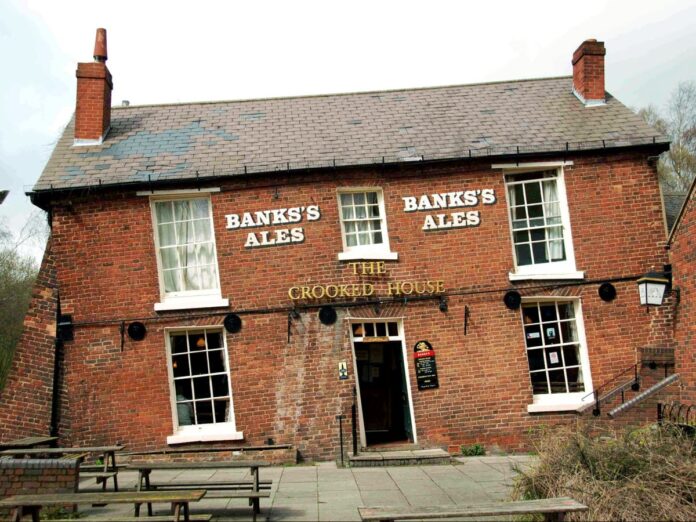T he arson-hit Crooked House, infamous for its status as the ‘wonkiest pub’ in Britain , could be reconstructed ‘brick by brick’ – and retain its lopsided image . The pub burned down on 5 August, much to the dismay of those who frequented it . Demolished two days later without permission from the local council, more than 100 people gathered amidst the rubble to mourn its destruction. West Midlands Mayor Andy Street called for the pub to be ‘rebuilt brick by brick (using as much original material as possible’ in a letter to the council, with fans campaigning for the landmark’s reconstruction mobilising to create a Facebook group which now has more than 18,000 members. Signs are placed around what remains of The Crooked House pub bar Famed as ‘Britain’s wonkiest pub’, the Crooked House had fascinated tourists and locals alike since the eighteenth century. Constructed in 1765 in the Black Country village of Himley, near Dudley, it was originally used as a farmhouse on Oak Farm. Following a mining subsidence in the 19 th century, one side of the building subsequently measured approximately four feet lower than the other. The modern-day owners used this as an opportunity to create its quirky optical illusions, with pennies and marbles appearing to move uphill along the bar. Now, a construction expert has agreed that the beloved pub could ‘absolutely be rebuilt’ – but warned that the cost could render it ‘unviable.’ ‘The Crooked House could absolutely be rebuilt and would end up a safer building as subsidence would now not be the reason for its wonkiness. With so many images of the interior, some of which were purposefully designed to accentuate its lean, it could also look pretty much identical’, Rico Wojtulewicz, Head of Housing and Planning Policy at the National Federation of Builders told The Independent . ‘However, the cost of this rebuild may make the project unviable because highly prized materials, considerable skill and heritage expertise would be required to faithfully recreate this quarter of a century old building’, he added, estimating the cost at £1.5 million. ‘The challenge to sort and reuse existing bricks is labour intensive, and replicating it inside and out would be a considerable undertaking, therefore £1.5m seems a fair ballpark figure but it could go much higher due to new building regulations and a need to fix the historical subsidence issues’, Mr Wojtulewicz advised. Moreover, recreating the historic building’s innate image would be complex. ‘The building would be built to look as though it had a lean, rather than have a lean itself. This would involve optical illusions via the window frames, entrances, roofline, patio area, and brickwork patterns, for example on the building’s exterior leaf, while the inner leaf would provide structural support’, he added. Meanwhile, Historic England has revealed it is keen to ‘consider all possible avenues’, offering its support to South Staffordshire Council to see the pub reconstructed. ‘We are offering technical advice to South Staffordshire Council on the planning considerations of potentially rebuilding the pub. We recognise how strongly people feel about it since its loss and if the local community and local council feel there’s a strong case for rebuilding it, we would gladly continue to advise on next steps’, a spokesperson for Historic England told The Independent . But the battle towards the pub’s revival could be long, with one campaigner warning that it could face a similar fate to that of The Jester in Cockfosters, north London. The pub burned down in 2018, with Barnet Council subsequently expressing that it had ‘very little say’ over what could be constructed as a replacement. The pub was sold for £1m eight months later. The incident is far from the first time a beloved and culturally significant pub has come under threat in The Black Country. First licenced around 1860, the Fiddler’s Arms pub was only a short walk from the Crooked House. It had gone out of business in 2017 and was standing empty when it suffered a similar fate. In early 2021, developers put forward plans to demolish the pub, and build houses on the site. The local council and residents objected. The ‘Fiddle’ was a locally listed building, considered culturally significant and beloved by people in the area. The application to demolish was withdrawn in May. It suffered an arson attack the following month, and was demolished shortly after. Likewise, in 2001, the famous central Wolverhampton pub The Elephant & Castle was suddenly demolished, sparking outrage in the city. Both pubs were under consideration for listed status by Historic England at the time they were demolished – had this been granted, it would’ve made tearing them down a lot more legally challenging. ‘Someone tried to burn it down once, and it didn’t work,’ said Ben Alcock, who lives locally, of the Fiddler’s Arms. ‘It had become an ongoing joke like, ‘are they going to try and burn it down again?” ‘Then I walked past one day and it was just gone’.
Arson hit Crooked House pub may be rebuilt ‘brick by brick’ – but will it be wonky?
Sourceindependent.co.uk
RELATED ARTICLES


